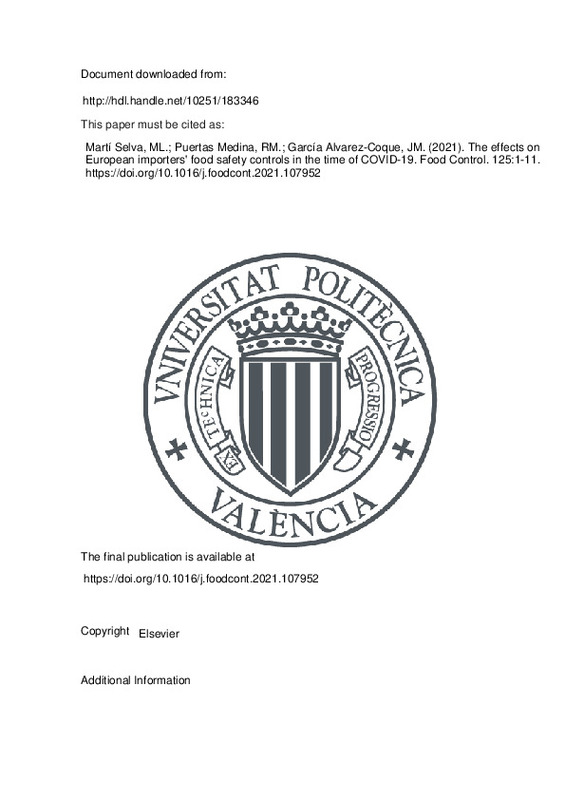JavaScript is disabled for your browser. Some features of this site may not work without it.
Buscar en RiuNet
Listar
Mi cuenta
Estadísticas
Ayuda RiuNet
Admin. UPV
The effects on European importers' food safety controls in the time of COVID-19
Mostrar el registro sencillo del ítem
Ficheros en el ítem
| dc.contributor.author | Martí Selva, María Luisa
|
es_ES |
| dc.contributor.author | Puertas Medina, Rosa María
|
es_ES |
| dc.contributor.author | García Alvarez-Coque, José María
|
es_ES |
| dc.date.accessioned | 2022-06-15T18:04:46Z | |
| dc.date.available | 2022-06-15T18:04:46Z | |
| dc.date.issued | 2021-07 | es_ES |
| dc.identifier.issn | 0956-7135 | es_ES |
| dc.identifier.uri | http://hdl.handle.net/10251/183346 | |
| dc.description.abstract | [EN] COVID-19 has highlighted the fragility of the global economic system. In just a few months, the consequences of the pandemic have left their mark on the affected countries at all levels and without exception. This article analyses the profile of food safety notifications reported by European countries in the first five months of 2020. The aim was to detect possible changes in food safety regulations imposed by control authorities that could aggravate the economic impacts of the pandemic. While COVID-19 does not appear to be a foodborne disease, some outbreaks have been linked to imported food, which might have affected the food control behaviour of importing countries. In this study, contingency tables and clustering were used to assess differences between years and notification characteristics and to detect homogeneous groups to help identify how the reported notifications might have changed. In the period considered in this study, the volume of notifications on most imported foodstuffs decreased considerably. This decrease was a direct consequence of the fall in international trade, which might have increased countries' reliance on domestic sources. The COVID-19 crisis has not caused a substantial change in the profile of European countries¿ in terms of the characteristics of reported notifications (product category and risk decision). However, the worst affected countries have replaced border rejections with alerts, which may indicate greater reliance on intra-EU markets. | es_ES |
| dc.description.sponsorship | This research was supported by grant RTI2018-093791-B-C22 funded by Ministry of Science (Spain) and European Regional Development Fund | es_ES |
| dc.language | Inglés | es_ES |
| dc.publisher | Elsevier | es_ES |
| dc.relation.ispartof | Food Control | es_ES |
| dc.rights | Reconocimiento - No comercial - Sin obra derivada (by-nc-nd) | es_ES |
| dc.subject | COVID-19 | es_ES |
| dc.subject | Food notifications | es_ES |
| dc.subject | Contingency tables | es_ES |
| dc.subject | Cluster analysis | es_ES |
| dc.subject.classification | ECONOMIA APLICADA | es_ES |
| dc.title | The effects on European importers' food safety controls in the time of COVID-19 | es_ES |
| dc.type | Artículo | es_ES |
| dc.identifier.doi | 10.1016/j.foodcont.2021.107952 | es_ES |
| dc.relation.projectID | info:eu-repo/grantAgreement/AEI/Plan Estatal de Investigación Científica y Técnica y de Innovación 2017-2020/RTI2018-093791-B-C22/ES/FORTALECIENDO LAS POLITICAS DE INNOVACION EN EL SECTOR AGROALIMENTARIO/ | es_ES |
| dc.rights.accessRights | Abierto | es_ES |
| dc.contributor.affiliation | Universitat Politècnica de València. Departamento de Economía y Ciencias Sociales - Departament d'Economia i Ciències Socials | es_ES |
| dc.description.bibliographicCitation | Martí Selva, ML.; Puertas Medina, RM.; García Alvarez-Coque, JM. (2021). The effects on European importers' food safety controls in the time of COVID-19. Food Control. 125:1-11. https://doi.org/10.1016/j.foodcont.2021.107952 | es_ES |
| dc.description.accrualMethod | S | es_ES |
| dc.relation.publisherversion | https://doi.org/10.1016/j.foodcont.2021.107952 | es_ES |
| dc.description.upvformatpinicio | 1 | es_ES |
| dc.description.upvformatpfin | 11 | es_ES |
| dc.type.version | info:eu-repo/semantics/publishedVersion | es_ES |
| dc.description.volume | 125 | es_ES |
| dc.identifier.pmid | 33584020 | es_ES |
| dc.identifier.pmcid | PMC7869612 | es_ES |
| dc.relation.pasarela | S\428190 | es_ES |
| dc.contributor.funder | AGENCIA ESTATAL DE INVESTIGACION | es_ES |
| dc.contributor.funder | European Regional Development Fund | es_ES |







![[Cerrado]](/themes/UPV/images/candado.png)

